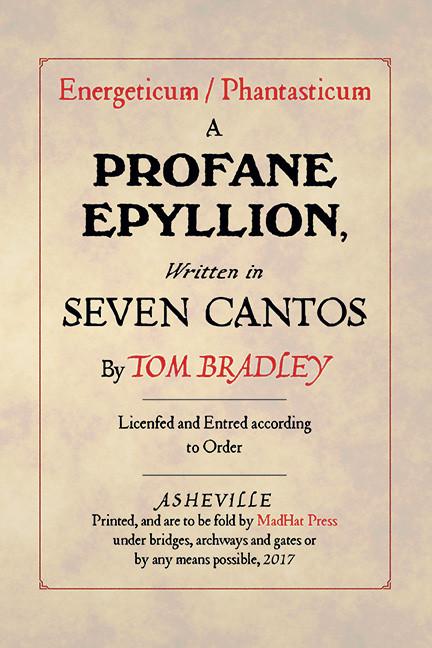
Tom Bradley has made me an outcast in my own home. Again.
This time, it’s Energeticum/Phantasticum: a Profane Epyllion in Seven Cantos, a handsome volume that begs to be read aloud. After following family members around the house for a few days declaiming choice snippets of Bradley’s vision, I was finally banished to the deck, where like a portly latter-day St. Francis I sermonized the first robins of spring. I was quickly fetched back inside.
Because of the profanity of the epyllion, you know. Neighbors!
Reading Bradley aloud: I go for a mellow baritone to properly render the rounded, rolling cadence of his verse, but it’s always punctuated by my contralto titters of pure delight at the beautifully executed wordplay – and by my occasional soprano shriek when a seemingly innocuous cultural reference from a previous canto erupts sideways and backward into a full-blown and subversive theme.
Always a pleasure, this read-aloud Bradley, but more so now than ever as he spins epic verse out of the first intentional LSD trip, its primordial pre-planning, the roster of its physical and metaphysical participants, the incidental summoning of demiurges, the circumstances of composition for its suboptimal background music, the extrapolation and/or prognostication of its only truly suitable accompaniment – an apocalyptic performance (see snippet of Canto IV, below) sure to bring down the house and trigger the heat death of the cosmos, that or a Las Vegas performance by Wayne Newton.
Glorious fun in serious trappings, bright threads of verse shuttling back and forth effortlessly across ages and cultures, and effortless is how it reads, no matter how Bradley has slaved over a hot keyboard. Just when it looks like he’s given short shrift to a tortured metrical foot, a quick re-read shows that he’s gone the extra mile, packing the line with extra crunchy goodness, making the whole as dense and fun and challenging as a British cryptic crossword puzzle. A second reading has turned up more goodies, and I’m sure that a third, later this year, will yield even more.
It is density most diverting. The reader – any reader who has a) come to this site and b) read this much of this review – will be pleased and flattered that the peculiar knowledge accrued during a lifetime of peculiar reading makes Bradley’s verse so rewarding:
“Hey, Carpophorus is my favorite bestiarius, too!”
“Finally, my knowledge of Nazi television broadcasting trials and methamphetamine usage pays off!”
“Look, honey! He calls that militant atheist fellah ‘Dead Hitch’ – maybe for scansion, maybe for disambiguation, maybe just for fun. Har!”
The references come thick and fast, whether they be pop, classical, theological, scatalogical, or pharmacological. It’s not necessary to enjoy the trip, but you may want to keep a smartphone handy, that or your annotated Puranas, Bibliotecha Classica, The Rise and Fall of the Third Reich, and your DSM V. Maybe the Upanishads and a good study Bible just in case.
Based on some of Bradley’s past prose bits lined up with Energeticum/Phantasticum (“Cue God, with an emphatic capital Gee!”), I suspect this poem has been rattling around in the Bradleybrain since at least 2012. I’ve been following him, you see (casually, and at a distance, so as not to startle him, liebchen).
A note on the volume itself: MadHat Press and Marc Vincenz have done a brilliant job with design and typography. The cover, pictured above, is consistent with the antiquarian feel within. The mottled watermark of inner pages is reminiscent of vellum, but on closer inspection, it’s a little more colorful than it has to be, a little blue, a little red, a little green, a visual reference to the liquid light shows at Ken Kesey’s Acid Tests of the mid-1960s, a fitting design for… Nah, I’m bullshitting you. It just looks like vellum, but if you stare at it long enough, you might get something. Just lick it a little and see. Tell me how it goes.
With the brilliant content, the possibly psychoactive properties of the watermark, the typographical flourishes, and the swanky crimson margin glosses, Energeticum/Phantasticum is a fine tome, and I’m seriously jealous of Tom Bradley now. No matter how many books you buy this year, Energeticum/Phantasticum is a keeper.
***
From MadHat Press:
Energeticum/Phantasticum: a Profane Epyllion in Seven Cantos recounts history’s first deliberate experimentation with LSD-25 (phantastica). Ernst Jünger, the notorious death-worshiping Iron Cross Honoree, slips in some amphetamine (energetica), resulting in a manifestation of the Plasmator, the insane spirit who has masqueraded as Jehovah for three millennia. During this Ur-bummer, which extends over fourteen hundred and sixty lines of blank verse, time and space are roundly violated. We sit in with Mozart as he composes an inferior concerto for an obese patron. We help Alexander Nikolayevich Scriabin annihilate humanity in the Himalayas. We reduce Christopher Hitchens and Richard Dawkins to little boys and tuck them into their bunk-bed for the night, where they suffer lucid dreams of Roman beast wranglers and concentration camp matrons hiding in the closet. The Plasmator barges back in and assumes the shape of Wayne Newton, the Midnight Idol, who closes off the show with a guest appearance, live from Las Vegas.
CANTO IV
If literature is glued between matte covers
or shat upon a dead machine’s display,
Scriabin’s mass demands a mighty gorge
in Himalaya’s crystal stratosphere.
It’s celebrated in a protean zone,
a cathedral built, or birthed, for the occasion.
This fane, like unicellular amoebae,
must writhe and swell, as counterpoint requires.
Scriabin tells us, ‘It is not constructed
of a single stony species, uniform,
but modulates with my Mysterium.’
The architecture’s further rubberized
by psychoactive aerosols, plus tints
projected from a clavier à lumières.
Typecast in the role of Celebrant,
Scriabin rides his lectern in the apse
of this gaseous and hierophantic temple.
He goads and taunts an orchestra of thousands
to scrape augmented sharp-eleven chords.
Unruly gangs, antiphonal mixed choirs,
their eros uncontainable in words,
regurgitate the Demiurgic ichor
from larynxes, both super- and subhuman.
Perspiring, swelling, in the corbelled vaults,
church bells the size of yacht hulls, gold alloyed
with electrum from Ezekiel’s ecstasy,
are hung from cumulonimbic fixity,
imbued and seeded with twelve metric tons
of benzoin, storax, myrrh, of galbanum,
of yellow sandalwood, of cinnamon,
in bonfires kindled by the praying mob,
who, on the seventh day of group orgasm,
become cloudlike themselves, unknowable
from entheogenic mists that melt the murals.
Everything’s tympanically tormented
by the agonizing Roosky Mystic Chord.
The planetary chassis struggles hard
to free itself from quartile iterations
of C, F-sharp, B-flat, E, A and D.
Promethean acts of mercy, will and grace,
self-sacrifice, plus devilish technique
by Alexander Nikolayevich
absolve parishioners’ Purgatorial pique
into a stable F-sharp minor triad.
This sonic normalcy brings down the beat
when congregation, clergy, all commixed,
like scent in a boudoir, are atomized.
It’s not the Night, but the Soirée of Brahma.
The mystery achieves Puranic purpose:
humanity’s abject annihilation,
and hatching of a wholesome race of Houyhnhnms
from soup, primordial, that phosphoresces
in pools on pulverized cathedral pews.
Scriabin, having braved the Manvantara,
is reborn in the Golden Satya Yuga.
